Jamii Bora Bank and National Bank of Kenya (NBK) #ticker:NBK have returned to profitability and are growing their shareholder funds as subsidiaries of their respective parent firms Co-op Bank and KCB Group which acquired them in rescue deals.
The transactions demonstrate the benefits of economies of scale that have enabled the big banks to turn around the performance of the new subsidiaries in a short time.
Co-op Bank #ticker:COOP acquired a 90 percent stake in Jamii Bora in August last year for Sh1 billion and renamed the small lender to Kingdom Bank.
Results for the nine months to September show that Kingdom Bank made a net profit of Sh413.1 million compared to a loss of Sh200.9 million in the year ended December 2020 when Co-op Bank first consolidated the subsidiary.
Kingdom Bank’s shareholder funds have grown to Sh1.6 billion from Sh1.2 billion over the same period. The performance has benefitted both Co-op Bank and the minority shareholders who have not had to provide additional capital since the buyout was completed.
Kingdom’s minority investors, who were diluted heavily in the transaction, previously faced the prospect of losing their entire capital as the lender was undercapitalised and was relying on regulatory forbearance to keep operating.
Besides access to large pools of capital and liquidity, subsidiaries of major banks benefit from their parent companies’ brand and technological infrastructure among other advantages.
NBK has also thrived under the ownership of KCB #ticker:KCB with its net income rising to Sh1 billion in the nine months to September from a net loss of Sh336 million in the year ended December 2019 when its acquisition was completed.
NBK’s shareholder funds have grown to Sh13 billion from Sh11.7 billion over the same period.
Shareholders of NBK were allotted shares in KCB, giving them exposure to the big bank’s diversified and profitable operations from which it pays the largest absolute dividends in the banking industry.
KCB subsequently provided NBK with a total of Sh8 billion comprising capital injection and shareholder loans to help the subsidiary meet its minimum capital requirements.The subsidiary is yet to comply but KCB says it is on course to doing so, noting that this will be achieved from its growing profits.“We are already on track. We have done our simulations and we should be compliant before the end of the year. This is one of the strongest performances by NBK that we have seen in many years,” KCB’s chief executive Joshua Oigara told Business […]
